
The Sea of Japan(see below for other names) is the marginal sea between the Japanese archipelago, Sakhalin, the Korean Peninsula, and the mainland of the Russian Far East. The Japanese archipelago separates the sea from the Pacific Ocean. Like the Mediterranean Sea, it has almost no tides due to its nearly complete enclosure from the Pacific Ocean. This isolation also affects faunal diversity and salinity, both of which are lower than in the open ocean. The sea has no large islands, bays or capes. Its water balance is mostly determined by the inflow and outflow through the straits connecting it to the neighboring seas and the Pacific Ocean. Few rivers discharge into the sea and their total contribution to the water exchange is within 1%.
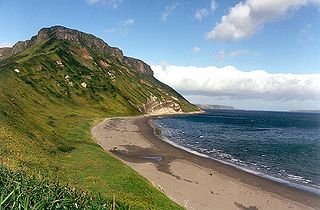
The Kuril Islands or Kurile Islands are a volcanic archipelago administered as part of Sakhalin Oblast in the Russian Far East. The islands stretch approximately 1,300 km (810 mi) northeast from Hokkaido in Japan to Kamchatka Peninsula in Russia, separating the Sea of Okhotsk from the north Pacific Ocean. There are 56 islands and many minor islets. The Kuril Islands consist of the Greater Kuril Chain and, at the southwest end, the parallel Lesser Kuril Chain. They cover an area of around 10,503.2 square kilometres (4,055.3 sq mi), with a population of roughly 20,000.
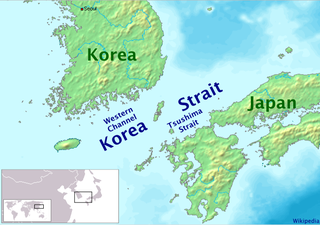
Tsushima Strait or Eastern Channel is a channel of the Korea Strait, which lies between Korea and Japan, connecting the Sea of Japan, the Yellow Sea, and the East China Sea.
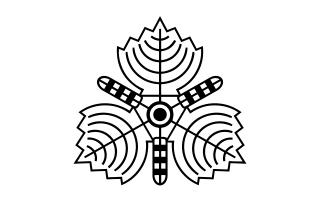
Karafuto Agency, from 1943 Karafuto Prefecture, commonly known as South Sakhalin, was a part of the Empire of Japan on Sakhalin. It was part of the gaichi from 1907 to 1943 and later a prefecture as part of the naichi until 1945.

Seiji Miyaguchi was a Japanese stage and film actor who appeared in films of Akira Kurosawa, Yasujirō Ozu, Mikio Naruse, Keisuke Kinoshita, Tadashi Imai and many others.

Crambinae is a large subfamily of the lepidopteran family Crambidae, the crambid snout moths. It currently includes over 1,800 species worldwide. The larvae are root feeders or stem borers, mostly on grasses. A few species are pests of sod grasses, maize, sugar cane, rice, and other Poaceae. The monophyly of this group is supported by the structure of the tympanal organs and the phallus attached medially to the juxta, as well as genetic analyses.
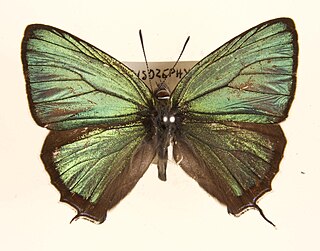
Chrysozephyrus is a butterfly genus in the family Lycaenidae. They were formerly included in Thecla. The genus is diverse and ranges from Russia to northern India.
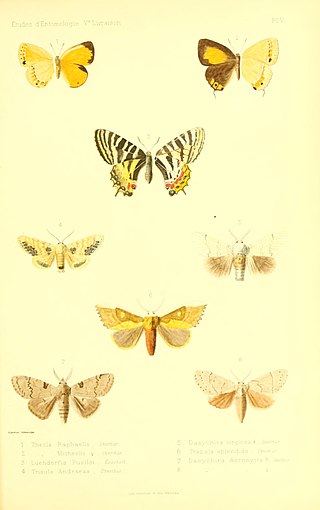
Coreana is a butterfly genus in the family Lycaenidae. The genus is monotypic, containing the single species Coreana raphaelis, which is found in the east Palearctic in Ussuri, north-east China, Korea and Japan (Honshu).

Favonius is a Palearctic genus of butterflies in the family Lycaenidae.
Leucantigius is a monotypic butterfly genus in the family Lycaenidae. Its only species is Leucantigius atayalica.
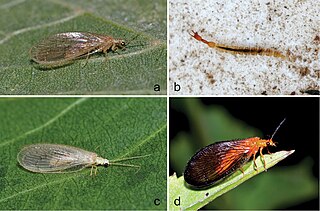
The Nevrorthidae are a small family of lacewings in the order Neuroptera. There are 19 extant species in four genera, with a geographically disjunct distribution: Nevrorthus, comprising 5 species with scattered distributions around the Mediterranean; Austroneurorthus, with two species known from southeastern Australia; Nipponeurorthus, comprising 11 species known from China and Japan; and Sinoneurorthus, known from a single species described from Yunnan Province, China. They are traditionally placed in the Osmyloidea, alongside Osmylidae and the spongillaflies (Sisyridae), but some research has considered them to be the sister group to the rest of Neuroptera. The larvae have unique straight jaws that are curved at the tips, and live as unspecialised predators in the sandy bottom sediments of clear, fast flowing mountain rivers and streams. They pupate underwater on the underside of stones. The adults are likely predators or feed on honeydew and other sugar-rich fluids.

Mount Hayachine is the highest mountain in the Kitakami Range, located in the Tōhoku region of northern Honshū, Japan. With an elevation of 1,917 m (6,289 ft), it is the second highest in Iwate Prefecture after Mount Iwate. Mount Hayachine is mentioned in 100 Famous Japanese Mountains, a book written in 1964 by Kyūya Fukada. The mountain is on the borders of the municipalities of Hanamaki, Tōno, and Miyako, east of the prefectural capital of Morioka.
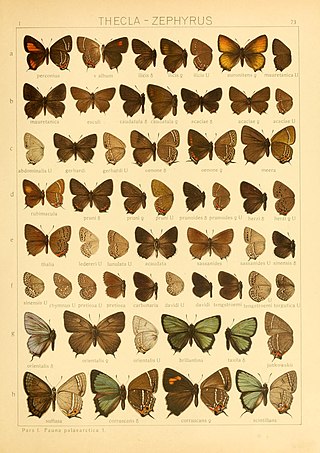
Chrysozephyrus brillantinus is a small butterfly found in the East Palearctic that belongs to the lycaenids or blues family.

Chrysozephyrus smaragdinus is a small butterfly found in the East Palearctic that belongs to the lycaenids or blues family.

The Ainu languages, sometimes known as Ainuic, are a small language family, often regarded as a language isolate, historically spoken by the Ainu people of northern Japan and neighboring islands.














